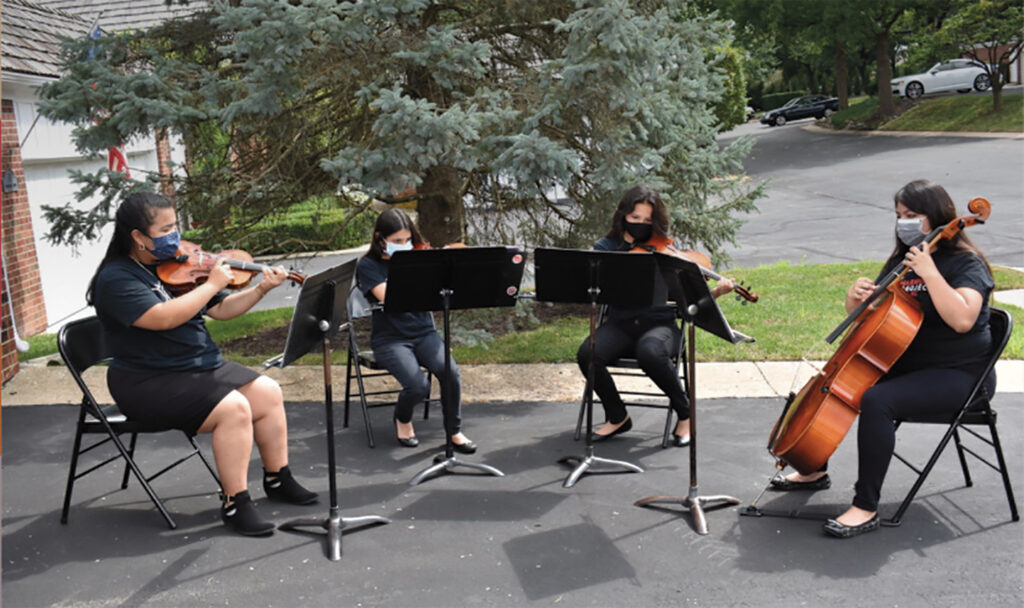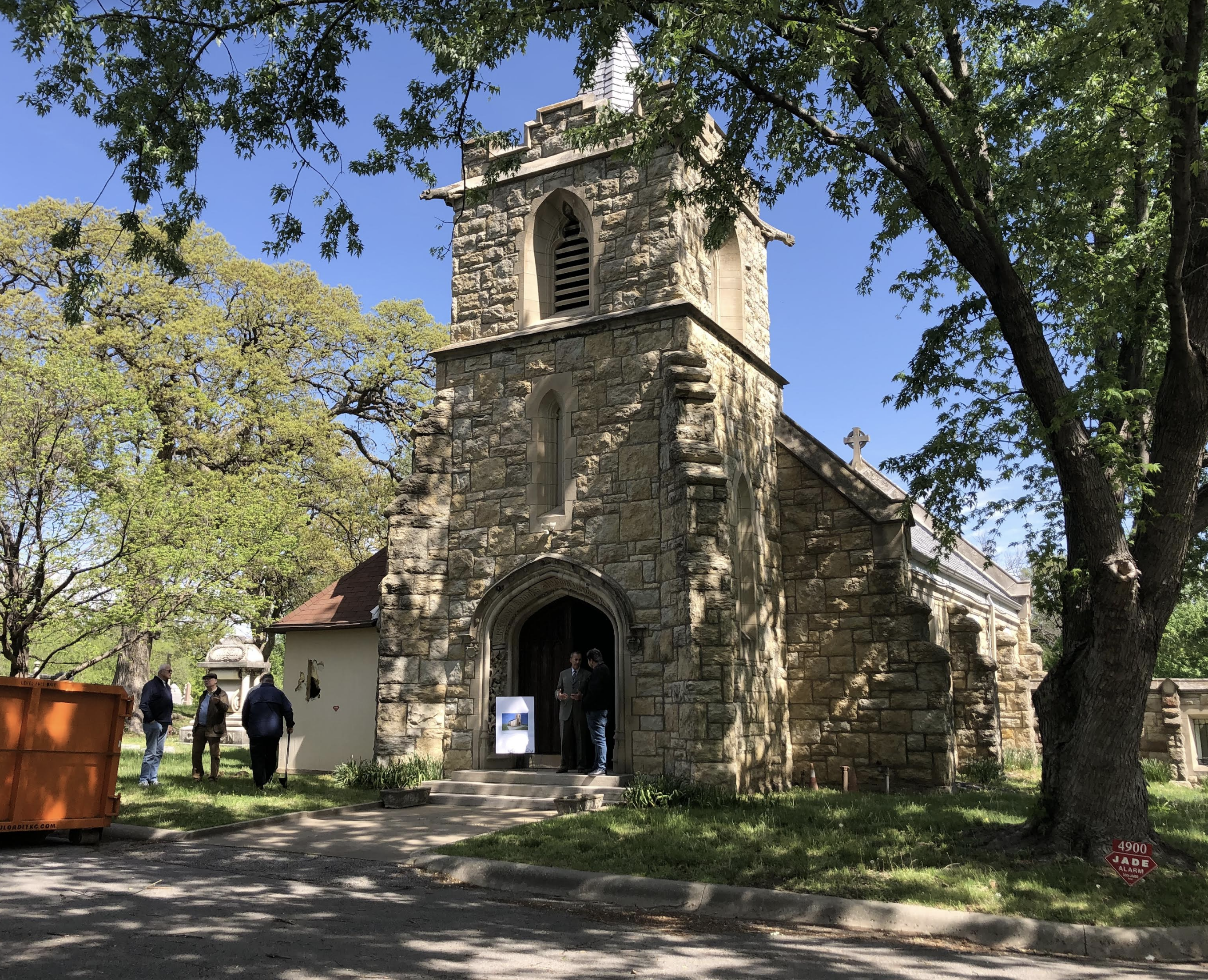
Abby Hoover
Managing Editor
The Northeast Community Center has been paving the way for young urban core musicians through Harmony Project, based out of the Northeast Community Center at 544 Wabash, an after school music and mentoring program for youth. Now, the woman who worked to make her vision a reality five years ago is being recognized statewide.
In December 2020, the 2021 Missouri Arts Award for Leadership in the Arts was awarded to Laura Shultz, Executive Director of the Northeast Community Center, for her work with Harmony Project KC, the local iteration of a Los Angeles-founded music program that, through education and mentoring, helps the community’s most vulnerable children and their families.
The Missouri Arts Council chooses recipients for the state’s highest honor in the arts and recognizes honorees for their “profound and lasting contributions to Missouri’s artistic and cultural legacy.” The categories are Arts Education, Arts Organization, Creative Community, Individual Artist, Leadership in the Arts, and Philanthropy.
“This one really is meaningful,” Shultz said of the award, with tears in her voice. “I get emotional because this one has actually put Harmony Project on the map here in the state of Missouri, and it’s just so rewarding to see that people are noticing how it works. It’s profound, it changes everything for these children.”
Michael Stern of the Kansas City Symphony and Margaret Martin, founder of Harmony Project in Los Angeles, and many others, nominated Shultz for the honor.
“There’s lots of great research out there about the power of music to improve academics, but also to advance social, emotional development and learning,” Development Director Kyla Pitts-Zevin said. “We are using music as the tool to elevate the wonderful, wonderful kids in Northeast.”
In 1941, Dr. J.B. Bisceglia founded the Northeast Community Center, opening it up for medical services, English lessons, the Boys and Girls Club and church services.
“He gained enough over the years to build the church in 1950, which is Christ Presbyterian Church, which was mainly attended by Italian immigrants from Sicily,” Shultz said. “They would hear of Bisceglia all over the country and come here because he would enfold the families and help them to survive in every single way.”
Years later in the 1980s, Bisceglia had passed away and a lot of the Italian families had moved out of the neighborhood, replaced by a wide variety of immigrants. Judge Charles Shangler, Bisceglia’s son-in-law, repurposed the building and the church into an Italian Cultural Center, which is what it was when Shultz met the family.
“We have so many languages that are spoken in our community, and the universal language is music,” Pitts-Zevin said. “So we have families in Harmony Project from all kinds of different backgrounds and all those kids are coming together to make music.”
Eventually, Shanlger opened one of the very first charter schools in the neighborhood, Scuola Vita Nuova (SVN), which existed on the site for 16 years before moving into the renovated Don Bosco Center in 2014 as it continued to grow.
“My history begins as a volunteer in the early days when the charter school first opened, and I had a commercial photography business in the River Market and I came and I would volunteer and I would teach the children photography and whatever else I could do to help Judge Shanlger get this place started,” Shultz said.
As Shanlger’s health started to fail, Shultz volunteered more and more until she eventually closed her studio to take over as executive director.
“I would help kids find scholarships to private high schools and teach them photography and just generally take care of the books, the community center and all that goes with that,” Shultz said.
When the building was vacated by SVN, the board of directors asked her what she was going to do with the empty building, being the only one left on site. At the time, she was part of the Northeast Alliance Together (NEAT), so she polled the neighborhood, and they requested three things: safety, out of school programs and better academic choices for their students.
“I had heard about Harmony Project in L.A., so I flew out there with my board president to check it out because we know what music does for children, I mean it’s just phenomenal,” Shultz said. “I learned so much while I was out there. It is a science-based program and Northwestern University was following the children at the time, proving what it does to a child’s brain: increases the ability to focus and learn and thrive.”
She returned to Northeast and got started. As a pediatric nurse who majored in youth development, though she had no musical training, it matched up with everything that she loved. Because she had friends within the symphony, like Stern, she reached out to him and music teachers at University of Missouri – Kansas City (UMKC) Conservatory, University of Kansas, William Jewell and others.
“I knew I could do the administrative part, but I needed musicians to take it on, so we got started,” Shultz said. “We hired this wonderful woman from South America. And she came and started as program manager and we have another woman from the neighborhood who is office manager, and the three of us just got started and recruited from 25 different schools and started with 33 students after school and on Saturdays.”
Of the schools students attend, no elementary schools had strings programs, and only 20% of middle and high schools did. With a 90% retention rate over the entire program, this year, the program was serving 250 students, beginning at age 6, before the pandemic hit. This enormous growth includes two public schools, Garfield and Wheatley, that they were asked to partner with.
“We will be back to that again hopefully when we are back in person,” Shultz said. “At the moment we’ve been doing remote learning, which is a challenge as you can imagine, getting internet and devices into the hands of our children. It sure did point out the digital divide in this country.”
They continue to have a waiting list all the time, and more schools are interested in partnerships. Shultz said they are trying to grow carefully because their instructors are some of the best musicians and music educators in the city, and they’re all from high quality universities. They’ve been very faithful to the program, some of them have been there since the beginning.
“Because we’re following the mission of our original community center, our heart is here for now. We would like to take care of as many children as possible before we start sending people out to the rest of the city.”
When Shultz was young, being in a family of seven, they really didn’t have the kind of money for music lessons. Pitts-Zevin recalled a story Shultz had told her of playing a cardboard piano in school, which was her only childhood experience learning music.
“Everything that I imagined about myself being on Broadway or in an orchestra was just all imagination, and I have a deep, deep fondness for music, and never learned to play a thing,” Shultz said. “This is fulfilling the other part of me that understands what music does for people.”
Pitts-Zevin said Shultz is giving the gift she never got to have growing up. She has now given the gift of music to hundreds of kids through a lot of tenacity and perseverance.
The young orchestra has performed in every major arena in the city, including the Kauffman Center and Kauffman Stadium, the Folly Theatre and the Gem Theater.
“Not only do the kids get to perform in these iconic venues, they also feel that they belong there,” Shultz said. “Most of them had never been inside the Kauffman Center, but they feel like it’s theirs now. They’ve played there so many times, they’ve observed or hung out with Yo Yo Ma. They have no qualms about walking into those venues, which, you know, normally is the case for children who haven’t had those opportunities.”
Shultz said this leads to them believing that they belong in higher education, as well. The program takes them to colleges and has college preparation classes for older students, host career panels and scholarship application workshops. Last year the program celebrated with its first high school graduate who got a four year scholarship to UMKC.
“They do feel like they belong; they feel like the opportunities are endless now,” Shultz said.
Spending three days a week for years with students, Shultz and the teachers get to know them and their families well. She said one of the secrets of the program’s success is family involvement, and she loves seeing younger siblings joining the program. The program, including instruments and lessons, is completely free.
“It is a music program, but it’s so much more than that,” Pitts-Zevin said. “When you serve a child for their entire childhood, that family really opens up to you and you become part of one another’s community, so I think the support and the love and the stability we provide, I have no doubt in my mind that it helps children succeed in school.”
Shultz said the program removes the barriers that are there on a daily basis for so many children, especially through leadership and mentorship courses. Each year they expand the program, so by the time they go off to college, students have experienced so many things like internships and shadowing medical students at Kansas City University.
“They really, really have to work hard to stick with it, and it’s so impressive,” Shultz said. “We really aren’t doing it for them, we’re giving them the opportunity to do it themselves to pull themselves up and out and academically and socially improving lives.”


















